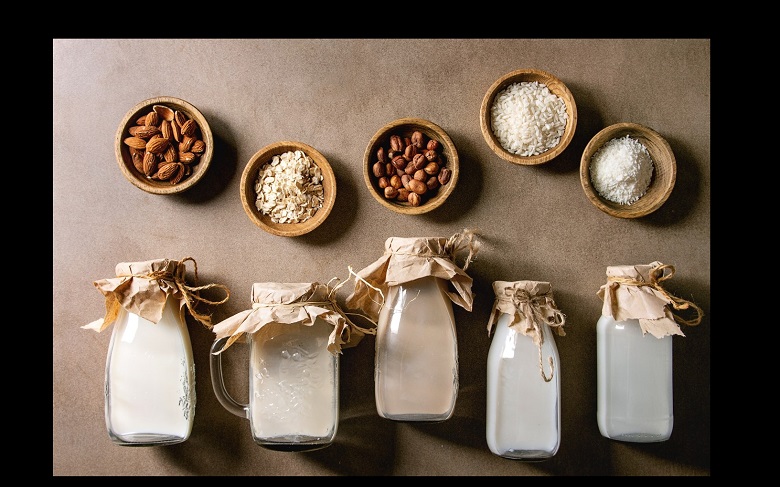The popularity of non-dairy milk alternatives is impossible to ignore. From humble grains to nutrient-packed beans, humans can make ‘milk’ from the most unsuspecting ingredients. Fridges at cafes all seem to have a large selection, so you can almost always find your favourite, or at least your second favourite alternative milk, to have with your coffee.
Since 2012, Google Trends shows us that popularity for oat, soy, and almond milk spiked in January each year, with almond milk being the most searched in monitored regions worldwide. The new-year spike may have everything to do with well-intentioned people embarking on New Year’s Resolutions. The reasons behind the early-year shift could be lifestyle related–changes due to climate change or diet tweaks to live healthier lifestyles.
With cow’s milk having a better nutritional profile than vegan alternative milk, with more protein and micronutrients, it’ll be interesting to examine why we’re becoming so obsessed with non-dairy milk alternatives. Could it be that alternative milk companies spoiled the wholesome reputation of cow’s milk? A look into A2 milk products and their many benefits could also help us find the healthiest milk alternative.
Trends Relating to the Rise of Milk Alternatives
It not only seems like milk alternative converts are growing in number but the favoured type of milk alternative changes over time, too. Out of the big three (almond, soy, and oat), interest in each type rises and falls. So what is the most popular milk? As mentioned, it’s almond milk right now in most regions, but it was soy milk for a long time, and oat milk may eventually become the favourite if it hasn’t already come out on top.
The pattern shows that interest in particular alternative milk products is inconsistent and likely related to social trends. Let’s look at some of the trends affecting milk substitutes:
- Fitness Influencers on Social Media. Influencers influence what we eat. Looking back over the past decade, you’ll notice that influencers on platforms like Instagram promoted “clean eating” and veganism better than vegan campaigners had ever done. Eating cleaner, more colourful foods and ditching sugar, dairy, meat, and bread became trendy.
- More than a fad, many people are choosing veganism to help combat climate change. There are many alternative milk options for vegans for sipping, frothing, and even baking and cooking.
- More environmentally-friendly milk is preferred once information emerges about how much water is required to grow crops like almonds versus oat or hemp. With veganism on the up for reasons like health, animal welfare, and the environment, milk substitutes will remain popular.
- The Price. With the cost-of-living crisis many regions are now facing, the cost of cow’s milk is increasing due to higher fuel, feed, and fertiliser expenses, driving consumers to switch to save money on their weekly shopping bill.
- Allergies and intolerances. More and more infants require specialised formulas, such as cow’s milk alternatives in Australia, England, and Norway, exceeding predicted levels. And 70% of adults worldwide cannot easily digest lactose, the primary protein in milk.
These are all reasons that the consumption of milk alternatives is on the rise and cow’s milk and dairy foodstuffs are being pushed aside. A safe shift for many that still allows the proper intake of all the nutritional goodness of milk without digestional issues is A2 milk.
The Drawbacks of Plant-Based Milk Alternatives
None of the milk alternatives can match the nutritional profile of cow’s milk. While they have less overall fat than cow’s milk, many contain added sugars and micronutrients. Health-wise, soy milk is the best alternative. But what if you could have all the benefits of cow’s milk without the digestion disruption?
New Zealand brand NATUREDAY has combined ancient farming traditions with modern science to develop A2+ Probiotic Milk Powder. This innovative formula enhances the absorption of protein and nutrients in the human body. When it comes to milk alternatives, this product is superior because of its many benefits. A single glass of A2+ Milk contains the following:
- 4g of protein which is roughly 1.4 eggs, 50g of meat, or 420g of spinach
- 72% of an adult’s daily recommended calcium intake, plus vitamin D3 and vitamin A for absorption
- 7 billion probiotics, a dual combination of HOWARU Lactobacillus acidophilus and NCFM and Bifidobacterium HN019 for healthy digestion and natural immunity
- Vitamins E and C eliminate free radicals and enhance immunity
- Magnesium to maintain bodily functions
- Guaranteed seal of approval for flavour and nutrition
Milk powder isn’t a booming trend (yet), but that doesn’t mean consumers aren’t delightfully surprised by the ease of digestion and health benefits that NATUREDAY’s appetising formula provides. If you’re searching for a milk alternative or wondering which cow’s milk is the best, consider nutritional milk powder that’s digestible and beneficial for the whole family.




